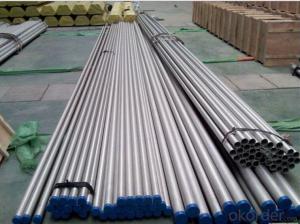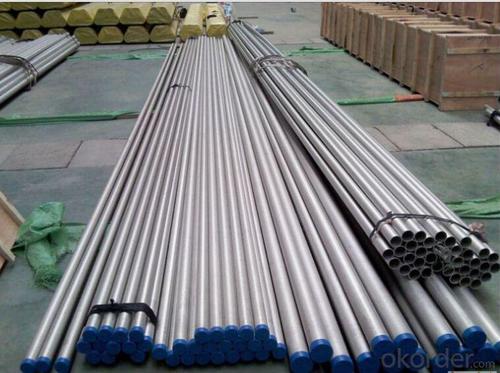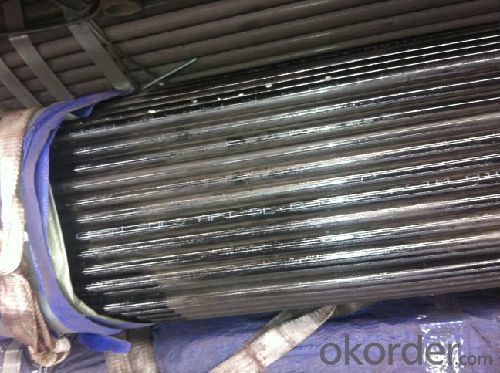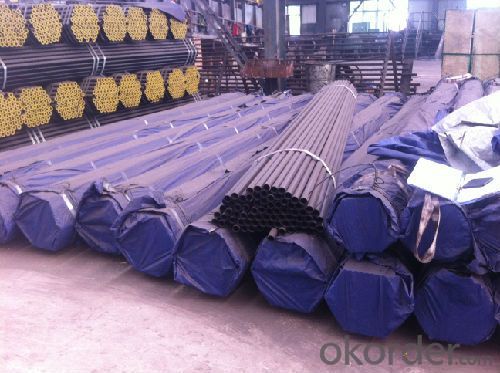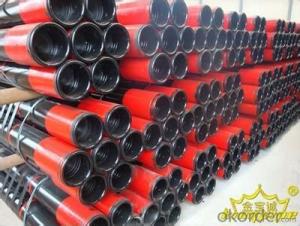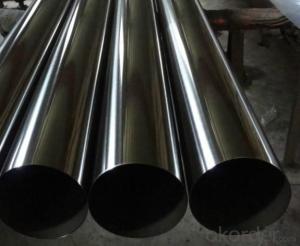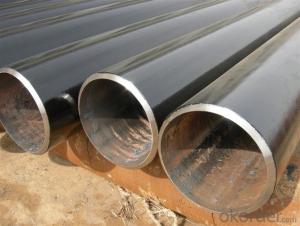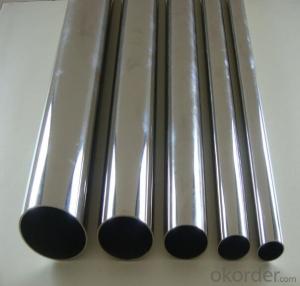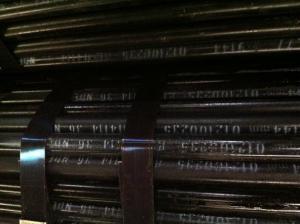Stainless Round Steel Pipes With Good Quality
- Loading Port:
- China main port
- Payment Terms:
- TT or LC
- Min Order Qty:
- 50 kg
- Supply Capability:
- 10000 kg/month
OKorder Service Pledge
OKorder Financial Service
You Might Also Like
1、Structure of Seamless Pipe :
Seamless pipe is formed by drawing a solid billet over a piercing rod to create the hollow shell, and it is regarded as withstanding pressure better than other types, and more easily available than welded pipe.
2、Main Features of the Seamless Pipe :
• Good visual effect
• Reasonable price
• High manufacturing accuracy
• High strength
• Small inertia resistance
• Strong heat dissipation ability
3、Seamless Pipe ASTM A106/53 Specification:
Standard | GB, DIN, ASTM ASTM A106-2006, ASTM A53-2007 |
Grade | 10#-45#, 16Mn 10#, 20#, 45#, 16Mn |
Thickness | 8 - 33 mm |
Section Shape | Round |
Outer Diameter | 133 - 219 mm |
Place of Origin | Shandong, China (Mainland) |
Secondary Or Not | Non-secondary |
Application | Hydraulic Pipe |
Technique | Cold Drawn |
Certification | API |
Surface Treatment | factory state or painted black |
Special Pipe | API Pipe |
Alloy Or Not | Non-alloy |
Length | 5-12M |
Outer Diameter | 21.3-610mm |
Grade | 20#, 45#, Q345, API J55, API K55, API L80, API N80, API P110, A53B |
Standard | ASME, ASTM |
4、Packaging & Delivery
Packaging Details: | seaworthy package,bundles wrapped with strong steel strip |
Delivery Detail: | 15-30days after received 30%TT |
5、FAQ of Seamless Pipe ASTM A106/53:
①How is the quality of your products?
Our products are manufactured strictly according to national and internaional standard, and we take a test on every pipe before delivered out. Guaranteed: If products’ quality don’t accord to discription as we give or the promise before you place order, we promise 100% refund.
②How about price?
Please trust the quotation we would give you, it is professional one.
③Why should you chose us?
Our service formula: good quality+good price+good service=customer’s trust
SGS test is available, customer inspection before shipping is welcome, third party inspection is no problem.
Any question, pls feel free to contact us !
6、Seamless Pipe ASTM A106/53 Images:
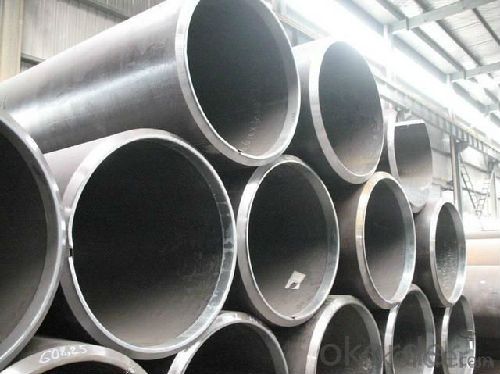
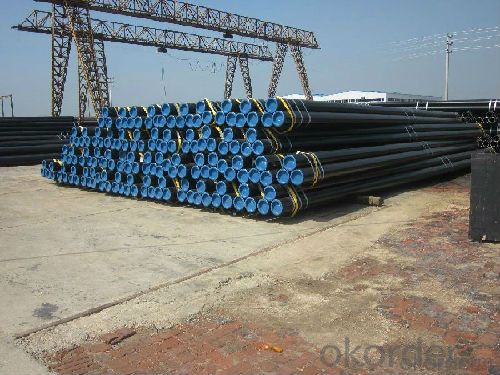
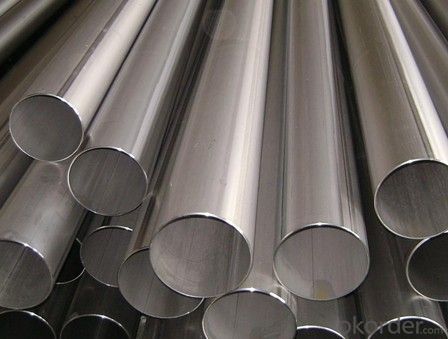
- Q: What are the different methods of pipe cutting for steel pipes?
- There exists a variety of techniques for cutting steel pipes, each tailored to specific circumstances and demands. Some of the most prevalent techniques are as follows: 1. Manual Pipe Cutters: These handheld tools are frequently employed for cutting smaller steel pipes. They typically feature a rotating cutting wheel that gradually creates a groove until the pipe is severed. Portable and relatively user-friendly, manual pipe cutters are suitable for on-site cutting tasks. 2. Hacksaw: The use of a hacksaw is a traditional and cost-effective means of cutting steel pipes. This method requires physical exertion and time; however, it can effectively cut pipes with smaller diameters. It is crucial to use a fine-toothed blade and apply steady pressure to ensure a clean and precise cut. 3. Reciprocating Saw: Also known as a sawzall, the reciprocating saw is a power tool that employs a back-and-forth cutting motion to swiftly and efficiently cut through steel pipes. These versatile saws can accommodate different types of blades to handle various pipe sizes and thicknesses. 4. Band Saw: Band saws are commonly employed in industrial settings for the purpose of cutting large steel pipes. These saws feature a continuous loop of teethed metal blade that moves on wheels, enabling precise and rapid cutting. Band saws are ideal for cutting large-diameter pipes and can be operated manually or fully automated for high-volume cutting tasks. 5. Pipe Cutting Machines: Pipe cutting machines are often utilized to achieve precise and consistent cuts. These machines are designed to cut steel pipes swiftly and accurately, making them suitable for large-scale industrial applications. Depending on the machine and requirements, various cutting methods like abrasive cutting, flame cutting, or plasma cutting can be employed. It is important to note that the selection of a pipe cutting method depends on factors such as pipe diameter, thickness, location, precision requirements, and available resources. It is imperative to adhere to proper safety precautions when working with any cutting method to prevent injury or damage to the pipes.
- Q: How are steel pipes used in the construction of telecommunications towers?
- Steel pipes are commonly used in the construction of telecommunications towers as they provide a strong and durable framework for supporting the tower structure. These pipes are used to create the main mast or tower structure, providing stability and strength to withstand various weather conditions. Additionally, steel pipes are often used for mounting antennas and other equipment on the tower, ensuring secure installation and efficient signal transmission.
- Q: Can steel pipes be bent or curved?
- Yes, steel pipes can be bent or curved using specialized machinery and techniques such as cold bending, induction bending, or hot bending.
- Q: How do you calculate the pipe head loss for steel pipes?
- The Darcy-Weisbach equation is utilized for calculating the pipe head loss in steel pipes. This equation establishes a connection between the head loss (hL) and various factors such as the flow rate (Q), pipe diameter (D), pipe length (L), fluid density (ρ), fluid velocity (V), and the friction factor (f). The formula can be expressed as: hL = (f * (L/D) * (V^2))/(2g) Where: - The head loss (hL) is measured in meters - The friction factor (f) is dimensionless - The pipe length (L) is measured in meters - The pipe diameter (D) is measured in meters - The fluid velocity (V) is measured in meters per second - The acceleration due to gravity (g) is typically taken as 9.81 m/s^2 The friction factor (f) relies on the Reynolds number (Re) of the flow, which is a dimensionless quantity representing the ratio of inertial forces to viscous forces. The Reynolds number can be calculated using the following equation: Re = (ρ * V * D) / μ Where: - The Reynolds number (Re) is dimensionless - The fluid density (ρ) is measured in kg/m^3 - The fluid velocity (V) is measured in meters per second - The pipe diameter (D) is measured in meters - The dynamic viscosity of the fluid (μ) is measured in Pa·s or N·s/m^2 The friction factor (f) can be obtained from empirical correlations or from Moody's diagram, which establishes a connection between the Reynolds number, the relative roughness of the pipe surface, and the friction factor. By substituting the calculated friction factor (f) and other known values into the Darcy-Weisbach equation, the head loss in the steel pipe can be determined. It is important to note that the head loss represents the energy lost due to friction and other factors and is usually expressed in terms of pressure drop or height difference.
- Q: How are steel pipes used in the construction of buildings?
- Steel pipes are commonly used in the construction of buildings for various purposes such as structural support, plumbing, and electrical installations. They provide strength and durability, allowing for the construction of high-rise buildings and large-scale structures. Steel pipes are used to create the framework of the building, forming the skeleton that supports the weight and load of the structure. Additionally, steel pipes are used for plumbing systems, effectively transporting water and sewage throughout the building. They are also used for electrical installations, providing a safe and efficient conduit for wiring. Overall, steel pipes play a crucial role in the construction of buildings, ensuring stability, functionality, and longevity.
- Q: What are the different types of fittings used with steel pipes?
- There are several different types of fittings that are commonly used with steel pipes. These fittings are designed to connect, control, or change the direction of flow in a piping system. Some of the different types of fittings used with steel pipes include: 1. Elbow fittings: These fittings are used to change the direction of flow in a piping system. They come in various angles, such as 45 degrees or 90 degrees, and are commonly used to navigate around obstacles or create bends in the pipe. 2. Tee fittings: Tee fittings are used to create a branch or split in a piping system. They have three openings, with one being perpendicular to the other two. This allows for the connection of two pipes at a 90-degree angle. 3. Coupling fittings: Couplings are used to connect two pipes of the same size together. They are usually threaded and can be easily tightened or removed using a wrench. Couplings are commonly used in applications where pipes need to be joined or repaired. 4. Reducer fittings: Reducers are used to connect pipes of different sizes together. They have one end that is larger in diameter and another end that is smaller. Reducers are often used to transition between pipe sizes or to adapt to different equipment or fittings. 5. Flange fittings: Flanges are used to connect pipes, valves, or other equipment to create a secure and leak-proof connection. They consist of a flat, circular plate with holes for bolts or screws to fasten the flange to the pipe. Flange fittings are commonly used in applications where frequent disassembly and reassembly is required. 6. Union fittings: Union fittings are used to join two pipes together in a manner that allows for easy disconnection. They consist of three parts: a nut, a female end, and a male end. Union fittings are often used in applications where periodic maintenance or repairs are necessary. 7. Cap fittings: Cap fittings are used to seal the end of a pipe. They are typically threaded and can be easily screwed onto the end of the pipe. Cap fittings are commonly used in applications where pipes need to be temporarily closed off or protected. These are just a few examples of the different types of fittings used with steel pipes. The specific type of fitting required will depend on the application, the size and material of the pipe, and the desired functionality of the piping system.
- Q: How do steel pipes handle soil movement?
- Steel pipes are able to handle soil movement effectively due to their inherent strength and flexibility. The sturdy nature of steel allows the pipes to withstand the pressures exerted by soil movement, while their flexibility enables them to adapt and adjust to changes in the soil's position without fracturing or breaking. Additionally, steel pipes can be designed with specific coatings and reinforcements to further enhance their resistance to soil movement, making them a reliable choice for various applications.
- Q: What is the difference between steel pipes and HDPE pipes?
- Steel pipes are made from a durable alloy of iron and carbon, while HDPE pipes are made from high-density polyethylene, a strong and flexible plastic material. Steel pipes are generally heavier and more rigid, making them suitable for high-pressure applications and structural support. HDPE pipes, on the other hand, are lighter, more flexible, and resistant to corrosion, making them ideal for underground and aboveground installations in various industries including water supply, gas distribution, and sewage systems.
- Q: What are the different methods of cutting steel pipes?
- The different methods of cutting steel pipes include using a hacksaw, pipe cutter, angle grinder with a cutting disc, reciprocating saw, plasma cutter, or oxy-fuel torch.
- Q: 45 and 316 which steel tubes are of high hardness?
- 316 stainless steel by adding Mo element, the corrosion resistance, and high temperature strength has greatly improved, high temperature can reach 1200-1300 degrees, can be used in severe conditions. 316F stainless steel is easy to cut stainless steel with high sulfur content. Good corrosion resistance, easy processing, good smoothness, suitable for axial parts.
Send your message to us
Stainless Round Steel Pipes With Good Quality
- Loading Port:
- China main port
- Payment Terms:
- TT or LC
- Min Order Qty:
- 50 kg
- Supply Capability:
- 10000 kg/month
OKorder Service Pledge
OKorder Financial Service
Similar products
Hot products
Hot Searches
Related keywords
